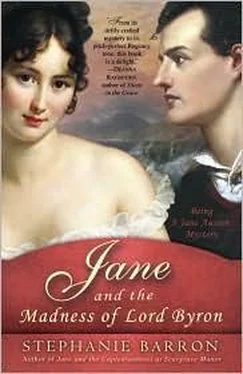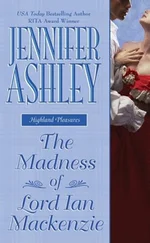He was a tall, broad, and exceedingly corpulent fellow, dressed in satin knee breeches, silk stockings, and shining black slippers with large gold buckles. His coat was dark blue superfine; his cravat was snowy, and so intricately tied as to support several of his chins. The top of his head was quite bald, but he compensated for the lack by wearing what remained of his hair luxuriantly long—a fall of curls, as gold as a newborn’s. He was so like an illustration from a ladies’ magazine of what a Master ought to be, that I nearly laughed outright; but Mona had seized my hand and begun to thread her way through the throngs of Fashionables and red-coated cavalry officers, all milling about the floor in expectation of the first dance. I had time enough to glimpse a touseled dark figure limp towards Lady Oxford—saw the Countess turn as though under the force of a spell, her countenance transformed by the intoxicating presence of Byron—and Mona had achieved the French windows.
“Good evening, Mr. Forth,” she said. “You have a sad crush this evening! I think we may declare the Brighton Season launched!”
“Countess,” the Master responded in a tone of profound gratitude; and swept Desdemona a low bow. For a large fellow, he was surprisingly nimble. “Our poor hamlet is made infinitely finer by your presence, and that of your excellent Earl—his Hessians undoubtedly by Hoby, his coats by Weston, his collars exactly the correct height, neither so low as to suggest a despicable carelessness, nor so high as to trumpet the Dandy—”
“Yes, yes,” Mona said impatiently, “but you must attend, Mr. Forth! I have been wanting to present my dear friend Miss Austen, lately of London and Hampshire, to your acquaintance—for this is her first visit to Brighton, you know, and there is no one but you who may put her in the correct way of things!”
“Charmed,” said Mr. Forth, taking my hand and bowing over it—but not before his gaze had run the length of my blue gown, and calculated its worth and probable age to a nicety. “London modiste , but not one of the greatest talents; beaded trim no longer fashionable this year—ought to have changed it for grosgrain; colour suits her, however, but I should recommend next time she chuse claret-colored sarcenet,” he murmured almost inaudibly under his breath.
“Do not regard him for the world, Jane,” Mona hissed in my ear as the Master recovered from his bows, mopping his bald pate with a handkerchief; “it is said he was born the son of a tailor, and cannot leave off the instincts of his trade however glorious his present station. Mr. Forth!” she cried. “You were present, I know, at Monday’s Assembly at the Castle. Miss Austen unfortunately was not—but her particular friend, Miss Catherine Twining, danced several dances to my certain knowledge.”
“Ah! Our lamented Miss Twining!” the Master cried; and his brown eyes—lugubrious and reminiscent of a hound’s—filled with sadness. “Diaphanous white muslin, circlet of rosebuds and pearls, satin slippers with shoe-roses to match. Irreproachable taste, of course, for Mrs. Silchester had the dressing of the girl—and tho’ the woman will be featherbrained, she remains good ton . I recall the toilette well. Miss Twining was everything that was charming. And a particular friend of Miss Austen’s, you would say? You have my sympathy, ma’am. Such an unaccountable death—nothing in her stile to suggest it—I fear the world is a very wicked place. Even in our poor hamlet!”
“I have been attempting to make sense of the senseless myself, sir,” I managed in a hollow tone. “And I have been endeavouring to record all the details of Miss Twining’s final evening—her last on earth!—no matter how small. I wished to convey a picture of her in a letter to my family, which shall be amazed to learn of her death”—as how could they not be, knowing nothing of Miss Twining at all—“and felt that in justice I ought to remember the gaieties she enjoyed, as only Catherine could, before her young life was so brutally cut short. The Countess”—I felt Mona’s title offered excellent value on the present occasion—“thought immediately of yourself , and said there should be no one in Brighton better able to recall the evening—which dances poor Catherine stood up for, and who were her partners. I should be infinitely happy if you should be so good as to search your memory …”
Mr. Forth closed his eyes an instant. “We opened, naturally, with a minuet, and closed the ball with another. Now, I recall Miss Twining had Mr. Hendred Smalls—nothing to remark in either stile or person, being entirely unworldly in his aspect, except as pertains to the Regent, whom he toadies unbearably—as partner for the first dance; also to the second, poor child, which was a contredanse. Mr. Smalls could not keep his mind on the figures, and was constantly giving offence with his stupidity in the dance. Now, who was her partner for the third? That would be the cotillion with Allemande; I believe it was young Holsten, the baronet’s heir just down from Oxford—excessive padding to shoulders and calves, coat by Hearn, white waistcoat and satin breeches—good ton , of course, but no shoulders, no air or address, and apt to stutter. Poor Holsten was greatly incommoded by Lord Byron—most careless in his cravat, patterned waistcoat not at all the thing, and that lamentable right foot—who persisted in interrupting the dance to importune Miss Twining for an interview, which she steadily refused. At the close of the cotillion, General Twining quitted the Assembly and left his daughter in Mrs. Silchester’s care.
“The fourth was a Scots reel; Miss Twining had young Captain Viscount Morley of the 10th to that one—very dashing fellow, excellent figure, excessively charming, cravat à la Napoleon , the new patent leather pumps. Captain Morley was most attentive, frowned down Lord Byron, whom he appeared to regard not at all, and carried Miss Twining into the supper room after the reel; they partook of smoked salmon, pistache cream, and champagne. Lord Byron again approached Captain Morley, and words were exchanged, at which point I intervened, so that peace might be restored. Lord Byron retired to the card room; and after this little interval, the Captain would, I believe, have partnered Miss Twining again—but she very rightly declined, so as not to appear too particular . The Captain, as I recall, watched the next dance—another cotillion—but solicited no other partner; none could please him after Miss Twining, it would seem. She acceded to Mr. Scrope Davies’s request—one of our most distinguished gentlemen. Such refinement of person! Such elegance in his watch chain and fobs! And tho’ his hair may suffer a trifle from thinning at the top—one cannot reproach a true gentleman for the vagaries of nature.”
My gaze inevitably strayed to Mr. Forth’s own gleaming scalp. He went on, imperturbably: “Miss Twining appeared greatly fatigued after the cotillion, as should not be remarkable in one so young. Mr. Davies, as I recall, endeavoured to lead her apart; he appeared most anxious to speak with her in private—pleading his friend Byron’s case, perhaps. He carried Miss Twining off to one of the chairs drawn up against the wall, and went in search of lemonade, for indeed his fair partner looked as tho’ she might faint—and I observed, in his absence, Lord Byron approach her. Miss Twining immediately started up, and would have quitted her place, but at that moment—it was perhaps midnight—Lady Caroline Lamb appeared at the entrance to the Assembly Rooms, and Lord Byron’s temper changed. Ah! Lady Caroline—remarkable air, extraordinarily outré looks, not at all what one wishes to emulate with the Brighton crowd, yet undeniably compelling. The Sprite, as Greek Muse! What one should call a leader of Fashion , if one could but find a lady brave enough to follow her. Sad, to see such talent enslaved to a mercurial temperament—”
Читать дальше












